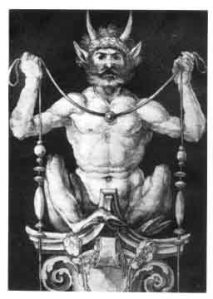Monotheism inevitably leads to agnosticism, and then atheism, because it cannot adequately explain the origins of evil. As Christians became increasingly better educated and more sophisticated they realized that the concept of an incredibly powerful evil spirit (the Devil) with a domain of his own (Hell) gave their religion a distinctly dualistic air. Since dualism is incompatible with monotheism, the notion of an evil entity opposed to God and responsible for the world’s and humanity’s evils had to be rejected. This left the concept of evil without an explanation.

Monotheism weakens religion by removing the Devil as an explanation for evil. (Image: public domain)
The blame for all that was evil in the world then fell upon human beings. However, the idea that all evil comes from humankind while all good comes from God seems unsatisfying to most. The notion that humans alone originate evil leads many to question why an omnipotent God does not cure them of their evil ways, or why such a God tolerates evil in the first place. The idea of God granting free will does not evade these questions. Why allow humanity to do wrong and then judge them for having gone astray? Why not create morally-good people to start with and shield all the tempted sinners from falling into wicked ways? What are we to make of the victims of the evildoers? Why should they suffer for the crimes of others? An incredibly complex web of dubious explanations is required to deal with these issues.
In addition, what are we to make of the terrible evils that obviously are not of humanity’s making?
The Christian Church fell back on the idea that humankind is indeed sinful, but some kinds of evil are actually a kind of moral misunderstanding. “God works in mysterious ways.” If something seemed grossly unjust or unfair (the death of a small child, for example), it was not the place of human beings to question the hidden motives or cryptic work of an omniscient and inscrutably benign God. As all of us who live in formerly Christian societies know, this evasive gem was (and probably still is) trotted out whenever something truly dreadful happened and folks got to wondering why God did it, or why He did not put a stop to it. Needless to say, such a pathetic obfuscation was not satisfactory and churchgoers began looking elsewhere for more enlightening explanations.
Agnosticism and atheism became increasingly popular positions. Questions of good and evil shifted away from religion and onto other considerations. The concept of struggling social classes gave birth to movements and ideologies like Marxism, socialism, anarchism, and nihilism. The idea of gender struggle gave us feminism. The purely philosophical approach yielded two of my favourites: Ayn Rand’s Objectivism and Hannah Arendt’s incredibly perceptive observation that ultimately, “evil is banal.”
Those who found they must still believe in something mystical also turned away from religion to embrace more philosophical (godless) belief systems like Buddhism and Taoism. Others took up the folk beliefs of horoscopes, Tarot cards, Ouija boards, and so on, which simply ignore serious moral issues of good and evil. Simple fatalism, that old pagan concept, once more enjoys immense popularity.
(Interestingly, Jung’s notion of Abraxas, a God who is the origin of both good and evil, is a more modern version of the older Christian idea that “God works in mysterious ways.”)
Monotheism has devastated Christianity. Only the evangelical sects whose preachers rant about the Devil seem to do well. Perhaps Islam survives and prospers precisely because it has kept the idea of the Devil and is effectively a dualistic religion. Muslims and Christian evangelicals alike “know” where evil comes from. They can “explain” its presence in the world. With a neat and tidy concept for which to blame evil, they are happy to keep the faith.
Evangelicals and Muslims are likely to continue their success. Devout evangelicals insist on a literal reading of the Bible, a position that forestalls any attempt to remove the Devil as the origin of evil. The ayatollahs and imams of the Muslim world are so opposed to secular education that more-sophisticated followers who may insist on a truly monotheistic religion will be slow in coming.
This is like reading a History channel transcript. I could see the scrolling pictures and hear the commentary in my mind. Love it. Well done as always.
Do you mind me asking what your own personal beliefs are?
I’m an unbeliever, Adam, a complete atheist. I believe that people mistake for God the sense of the numinous generated by the self when it senses something that resonates powerfully with its emotionally important ideas. Worshipping God is therefore a kind of vanity by proxy. You are unknowingly worshipping yourself (or your Self).
I enjoy scientific explanations when they are well done. For example, I admire Darwin and his beautiful ideas immensely. As you know from reading my humorous post, “The Trouble with Modern Scientists,” I don’t like mystical or even quasi-mystical explanations of any kind. The universe is ultimately understandable. Anyone who offers a mystical explanation is a muffin head who can’t accept that they weren’t smart enough to work things out and won’t wait until someone else can.
Muffin head! Can I borrow that one?
That was one of my favorite articles that you wrote. Honestly, I love reading your writings. I had some time this morning to sit down and do some reading for once, and this really hit the spot. I read in the evening most often, but by then, my brain is usually toast.
Thanks for sharing. Looking forward to the next!